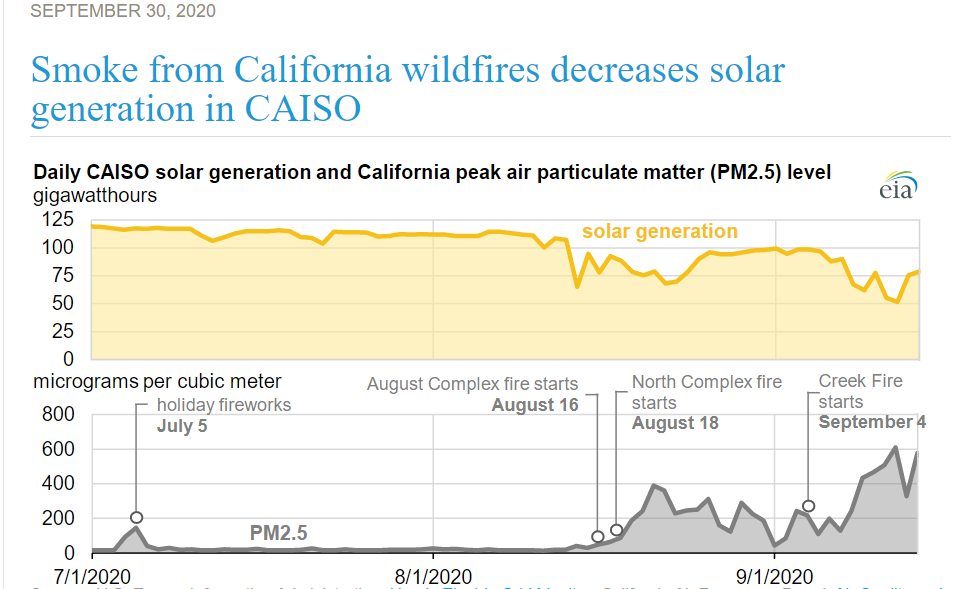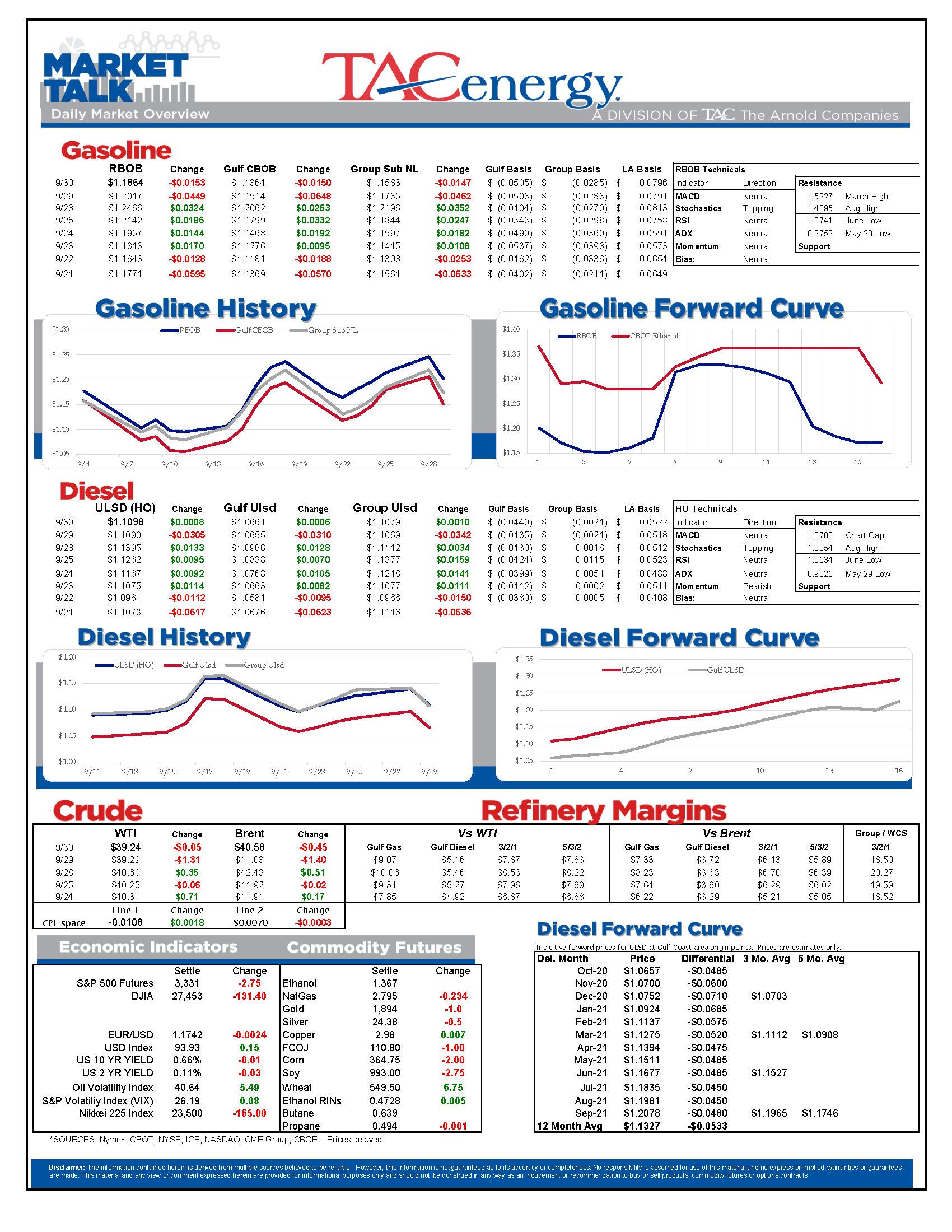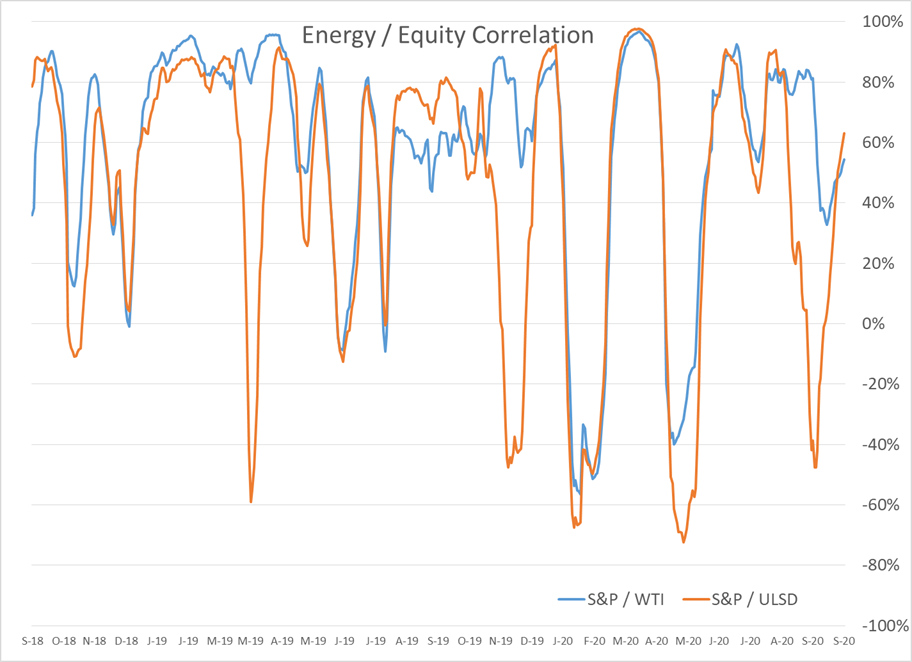Financial Markets Unimpressed By Debate Performance

The wheels came off the energy bus Tuesday, as a four day rally was largely wiped out in a single session. Gasoline prices are now leading the complex lower for a second day, after the leading the move higher during the run up.
This is the second cycle of the four-days-up, two-days-down pattern for RBOB futures in the back half of September, with a net result of prices increasing seven cents during that time. Nearly half of those gains will be wiped out when the November contract takes over the prompt position tomorrow, as we slide down the backwardation curve heading into winter. That roll will leave gasoline prices just one decent sell-off away from the lows of the summer trading range, with the seasonal demand drop looming and threatening another move below $1 - should that support finally break.
The API report seems to be driving the direction in the early going, as a build in gasoline stocks has RBOB under pressure while draws in distillate and crude inventories has those contracts holding steady. The DOE’s weekly report is due out at its normal time, 9:30 Central. October RBOB and ULSD contracts are expiring today, so watch the November contracts (RBX & HOX) for direction in the racks.
Financial markets were apparently not impressed by the debate performance last night, which foreshadows more volatility over the next month as the election looms and potentially even more price swings should the results be contested. While the correlation between equity and energy prices has been hit or miss this year, any major moves in stocks – particularly to the downside – have the ability to pull the energy complex (which is just a fraction of the size of equity markets in dollar terms) along for the ride.
As the momentum builds towards clean(er) energy options, it should be no surprise that Wall Street is being flooded with Green Energy acquisition companies (aka SPAC’s) seeking to capitalize on investor’s desire for new ideas, whether or not they’re proven. The movement certainly has a dot-com bubble feel about it, as the majority of the companies being purchased have no revenue stream, suggesting the move by PE groups to spin them off into the public markets has less to do with creating sustainable green energy platforms, and more with racing to put more green in their own pockets before the appetite for IPOs of unproven companies market dries up.
JP Morgan has reached a settlement with the CFTC and other agencies, and will pay a $920 million fine for trade spoofing in metal and treasury markets. There’s plenty of evidence that similar forms of manipulation have been happening in energy markets over the years as well, but it remains to be seen if any of those cases will come to light.
Marathon began implementing job cuts nationwide Tuesday, after announcing plans earlier this year to reduce workforce due to demand destruction. Shell is also announcing plans to cut 7,000-9,000 jobs over the next three years, but did not indicate where those cuts would take place.
Stop Smoking: The EIA published an interesting report on the negative impact California’s wildfires are having on solar electricity production, highlighting yet another challenge with the reliability of the state’s power grid.
Click here to download a PDF of today's TACenergy Market Talk.
Latest Posts
Week 15 - US DOE Inventory Recap
Prices To Lease Space On Colonial’s Main Gasoline Line Continue To Rally This Week
Equity Markets Have Been Pulling Back Sharply In Recent Days As Inflation And Trade Concerns Inject A Sense Of Reality Into Stocks
Gasoline And Crude Oil Prices Reached Fresh Multi-Month Highs Friday Morning As News Of The Anticipated Attacks Spread
Social Media
News & Views
View All
Week 15 - US DOE Inventory Recap

Prices To Lease Space On Colonial’s Main Gasoline Line Continue To Rally This Week
Energy markets are sliding lower again to start Wednesday’s trading as demand concerns and weaker stock markets around the world seem to be outweighing any supply concerns for the time being.
Rumors continue to swirl about an “imminent” response by Israel to Iran’s attacks, but so far, no news seems to be taken as good news in the hopes that further escalation can be avoided, even as tensions near the Red Sea and Strait of Hormuz continue to simmer.
Prices to lease space on Colonial’s main gasoline line continue to rally this week, trading north of 11 cents/gallon as Gulf Coast producers still struggle to find outlets for their production, despite a healthy export market. Gulf Coast CBOB is trading at discounts of around 34 cents to futures, while Gulf Coast RBOB is trading around a 16-cent discount, which gives shippers room to pay up for the linespace and still deliver into the East Coast markets at a profit.
Back to reality, or just the start of more volatility? California CARBOB basis values have dropped back to “only” 40 cent premiums to RBOB futures this week, as multiple flaring events at California refineries don’t appear to have impacted supply. The state has been an island for fuel supplies for many years as its boutique grades prevent imports from neighboring states, and now add the conversion of the P66 Rodeo refinery to renewable diesel production and the pending changes to try and cap refinery profits, and it’s easier to understand why these markets are increasingly vulnerable to supply shocks and price spikes on gasoline.
RIN prices continue to fall this week, touching 44 cents/RIN for D4 and D6 values Tuesday, their lowest level in 6 weeks and just about a nickel above a 4-year low. While the sharp drop in RIN and LCFS values has caused several biodiesel and Renewable Diesel producers to either shut down or limit production, the growth in RIN generation continues thanks to projects like the Rodeo refinery conversion, making the supply in RINs still outpace the demand set by the Renewable Fuel Standard by a wide margin.
The API reported draws in refined products, 2.5 million barrels for gasoline and 427,000 barrels for distillates, while crude oil stocks had an estimated build of more than 4 million barrels. The DOE’s weekly report is due out at its normal time this morning.
Click here to download a PDF of today's TACenergy Market Talk.

Equity Markets Have Been Pulling Back Sharply In Recent Days As Inflation And Trade Concerns Inject A Sense Of Reality Into Stocks
It’s a mixed bag for energy markets to start Tuesday’s session with gasoline prices holding small gains, while oil and diesel prices show small losses as the world anxiously debates what comes next in the conflict, we’re still hoping we don’t have to call a war in the Middle East.
An early sell-off picked up steam Monday morning with refined products down more than a nickel for a few minutes, before reports that Israel was vowing to respond to Iran’s attack seemed to encourage buyers step back in an erase most of the losses for the day.
Equity markets have been pulling back sharply in recent days as inflation and trade concerns inject a sense of reality into stocks that had been flying high earlier in the year. The correlation between gasoline and crude oil prices had been fairly strong for the past couple of months but has since weakened as the weakness in stocks hasn’t yet trickled over into the energy arena. Both asset classes are seeing a tick higher in their volatility (aka Fear) indices this week however, and when fear starts driving the trade, we often see these prices move together.
Diesel has been underperforming the rest of the energy complex for most of the year so far, and those hoping for lower diesel prices got more good news when the Dangote refinery in Nigeria began loading diesel for domestic use Monday, in the latest milestone for the giant project that will have a major influence on Atlantic basin supply. Naturally, local lawmakers are already complaining that the refinery’s prices are too high.
The EIA this morning highlighted the record amount of crude oil China imported in 2023 after reopening the country post-COVID and after completing numerous new refinery builds in the past few years. Russia accounted for the largest increase in shipments to China last year, as China is one of the few countries that doesn’t mind ignoring sanctions. Speaking of which, the US House is expected to take up a new vote this week on sanctioning Chinese imports of Iranian crude, which the EIA notes are often hidden by relabeling the crude to make it appear as if it originated in Malaysia, Oman or the UAE.
We’re just 2 weeks away from the startup of Canada’s long-awaited Transmountain pipeline expansion that will bring roughly 600,000 barrels/day of capacity to the Pacific basin. That new outlet is great news for Canadian producers long restricted by takeaway capacity, and bad news for Midcontinent refiners who have grown accustomed to the discounted Canadian grades. A Bloomberg article Monday noted that Iraq’s Basrah Heavy crude is most likely to be displaced by West Coast US refiners who can now buy much closer to home.
Click here to download a PDF of today's TACenergy Market Talk.


